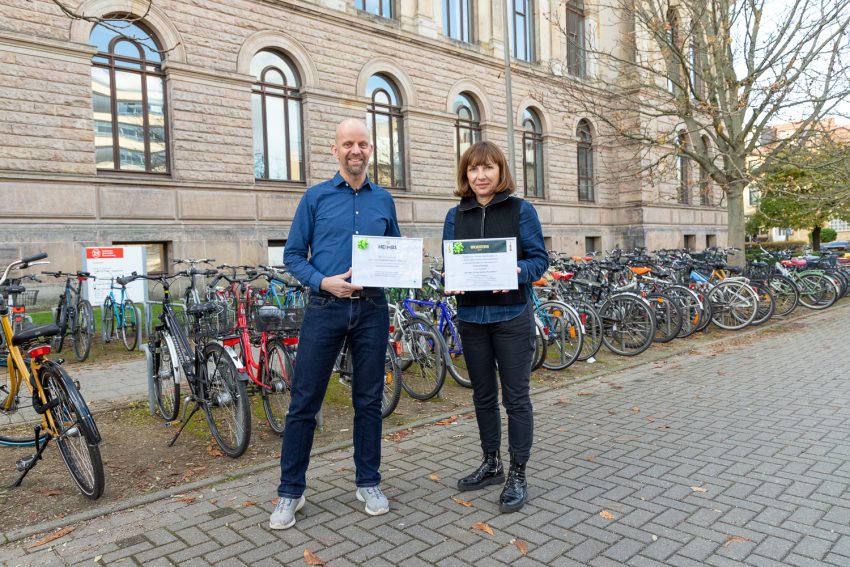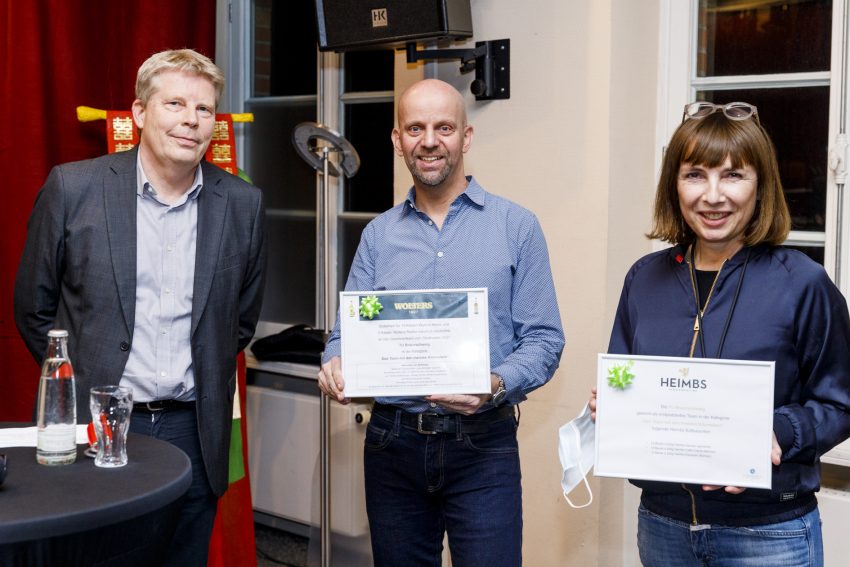Almost 40,000 kilometres cycled: TU team takes first place "Thinking about the climate is part of the ride"
Just getting on your bike and pedalling: The TU Braunschweig team did this very successfully. In the fifth Braunschweig City Cycling event, 224 TU cyclists covered a total of 39,900.9 km in three weeks in a climate-friendly manner. This meant that they won the category “the team with the most total kilometres” and also saved around 75,000 kg of CO2. City Planning Commissioner Heinz-Georg Leuer presented the award at an event in the Haus der Kulturen. Professor Sándor Fekete, Institute of Operating Systems and Computer Networks, and Silke Rumpf from the Department of Commercial Facility Management accepted the prize on behalf of the TU team.

Professor Sándor Fekete and Silke Rumpf were motivated to pedal energetically in the City Cycling competition. Photo credit: Kristina Rottig/TU Braunschweig
City Cycling is a nationwide campaign for better air, fewer cars, fitness, and climate protection. In Braunschweig, the competition, which took place from 5 to 26 September, set two new records with 6,892 participants and 1,294,809 kilometres cycled. The TU Braunschweig team was also able to improve on the previous year. After 7th place and 153 cyclists, the TU team won this year with 39,900.9 km cycled by 224 participants. With their successful participation, the TU Braunschweig team also supports the efforts for ecological, social and economic sustainability and sets an example for more climate-friendly mobility, climate protection and quality of life at the university.
In addition to the TU team, the academic music association Akablas was also awarded in the category “the association with the most kilometres per team member”. The 37 active members drove an average of 430.67 km.
Every kilometre counts
“A great success,” says President Professor Angela Ittel. “The participants have set an active example for climate protection in line with TU Braunschweig’s sustainability goals. I would like to thank all those who cycled, the long-distance cyclists and those who cycled many daily distances in an environmentally friendly way and will continue to do so in the future. Congratulations!”

City Planning Councillor Heinz-Georg Leuer presented the award for 1st place in the category “the team with the most total kilometres.” Photo credit Daniela Nielsen/City of Braunschweig
Silke Rumpf, who is in the lead among the female TU participants with 1,001.2 kilometres, reports on her participation: “I like to cycle every day and try to cover all the distances I can by bike. Thinking about the climate is always part of the ride.” At the same time, she is happy to be able to contribute to optimising the cycling infrastructure in Braunschweig through her experiences during her participation. “I also found it exciting to find out how many kilometres are feasible for me. During the competition period, I had a holiday and planned it as a cycling holiday, among other things. The weather was perfect, the routes too. The common goal of collecting kilometres, but also the idea of the competition, gave me additional motivation to cycle further distances than originally planned.”
Science is also a team sport
Professor Sándor Fekete from the Algorithmics Department of the Institute of Operating Systems and Computer Networks is the most eager cyclist from the TU Braunschweig team, having cycled 1,745.7 km. He told us about his long way there and what cycling has in common with science.
“This year, I was deeply impressed by some people cycling together because they are not discouraged by age limits: The youngest of them is 10, the oldest 86 years old. Real role models! This inspired me not only to roll in comfortably in between, but also to push myself to my own limits once again.
It was a long way to get there – well beyond the kilometres I have now cycled. ‘I was always bad at maths!’, many people say. My saying is: ‘I was always bad at sports!’ This went so far that when I was barely 15, I was sent to a health facility for a month in the middle of the school year because of a lack of exercise. The result: at 20, I was a participant in the European Triathlon Championships.
The year before, I had cycled 20,000 kilometres in one year, including 2,000 kilometres in one week, over the Alps with luggage. It happened bit by bit – I just kept cycling, like others go for a walk.
Patience is needed
With my studies, I needed to counterbalance the brain training. Of course, I also learned a lot in the process: many barriers are only in your head, but there are also limits that you have to respect: You can’t just jump over mountains or performance limits, you have to be patient until you get somewhere. In turn, this also gave me great strength during my studies: The time I spent on physical sports also made me faster and more persistent in my thinking.
At the same time, cycling races are also an intense team sport: you have to team up with others to stand a chance – together you can achieve things that are hopeless on your own! This makes it tremendously important to be very conscious and caring not only with yourself but also with others. Here, too, there are parallels to science: a team does not become stronger by the fact that the teammates distinguish themselves primarily against each other.
Slow and steady …
All those years after amateur cycling and in professional science, City Cycling was both relaxing and inspiring at the same time: with the serenity of experience, I understood that I can ride 33 km in an hour, or 180 km in 6 hours – but if I take it easy, I can also do 270 km in 10 hours. Slow and steady … Of course, I only ride such daily distances at the weekend. After all, I’m a professional in mental sports!”
